Q. What is the most memorable thing for you when you look back at the mission?
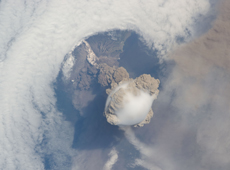
Volcanic eruption in the Kuril Islands viewed from the ISS (Courtesy of NASA/JAXA)
I was amazed at how quickly the human body can adapt to an unfamiliar weightless environment like space, which is completely different from Earth's atmosphere. In the confined weightless environment of the ISS, at first I floated around quite clumsily. But within several weeks, I started moving very smoothly, like a fish swimming at full speed in the ocean. I was even able to make an immediate, stable stop when necessary. I was also fascinated by the natural phenomena I unexpectedly caught sight of while watching our beautiful Earth. We saw an aurora, and a large volcanic eruption in the Kuril Islands, for example. I was very moved when I happened to lay my eyes on such occurrences.
Q. What were the thoughts that came to mind when you were viewing Earth from the ISS?
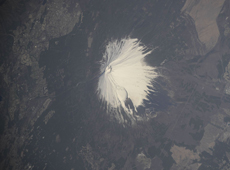
Mt. Fuji in Japan viewed from the ISS (Courtesy of NASA/JAXA)
Space is a world of complete darkness-so dark that you feel completely enclosed by it. Earth floats in the midst of this darkness. Seen from space, the beauty of our planet is striking, .I felt very fortunate to call it my home. Every time I watched the Earth, I felt a strong sense of determination to protect it. No matter how busy my work was or how different life in space was, the near presence of my home planet provided a sense of comfort. But if you were to fly to Mars, for example, you would not be able to see your home, the blue Earth, for a few years. As human space exploration continues to develop, people will land on Mars some day. I think that being away from Earth, without being able to see it for an extended period, will have a great psychological impact. As I observed the Earth every day, I often thought about this issue.
Q. How did you feel when you landed on Earth?
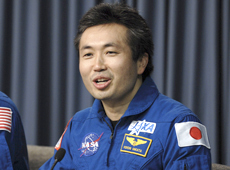
Astronaut Wakata at STS-127 press conference after landing (Courtesy of NASA)
When the space shuttle landed at the Kennedy Space Center, I felt the heaviness of gravity and realized that I really had come back down to Earth. When the hatch opened and the scent of grass entered the shuttle, I felt the Earth was welcoming us back. On the ISS, you don't experience the loveliness of a breeze sweeping over your face. I became more sensitive to how greenery on Earth soothes people's minds. When you look at plants and trees from the surface, you sense that they are full of life. It's not like that when you see them from space. After we landed, the pleasure of inhaling the air increased my appreciation of our planet, and my affection for it. These were my initial thoughts when I returned to the Earth.
The 4½ months in space went by so quickly since I was very busy throughout my flight with various tasks-experiments, systems maintenance, media relations and public events. It felt like I had only been gone for a 2-week business trip. It felt almost like everything had been a dream. I think this is because our experience in space was extremely different from our daily life on Earth, and probably because we worked in such a tough environment.
Q. It is said that a long stay in space weakens bones and muscles. How did you find it for yourself?
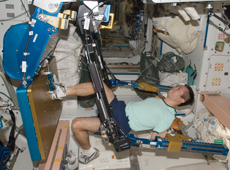
Astronaut Wakata exercising (Courtesy of NASA)
Personally, I didn't experience any weakening of my bones. Unlike Earth, a space environment is free from 1G gravity loads and, as a result, the calcium in bones begins to dissolve into the blood and urine. A case has been reported where the rate of bone density reduction was about ten times faster than in an osteoporosis patient on Earth. Bone density reduction in a weightless environment works differently from osteoporosis on Earth-leaching of calcium from bones can cause kidney stones. On this mission, I became the first subject in a joint Japan-U.S. experiment, and took an anti-osteoporosis drug throughout my stay. The data is still being analyzed. We need more astronauts to take part in the experiment, because a single subject is not enough to get a reliable result. It will take time to obtain more solid data. But when I had my bone density measured after my return to Earth, no reduction was seen. The result was quite favorable.
For my muscles, I did 2 hours of exercise every day in space. I know that I was maintaining my physical strength close to my pre-flight level. Onboard the ISS, we have devices for exercise similar to weightlifting machines that can be used in a weightless environment. Based on the data logged on the exercise devices, as well as observations of my aerobic exercises using a stationary cycle and a treadmill, it was evident that I lost very little physical strength in space. I was able to walk without any problems as soon as I returned to Earth. Based on the fact that my vestibular organs had functioned fine after my previous short duration space flights on the Space Shuttle, and considering my ability to maintain adequate muscle strength during the long duration stay on the ISS, I could assume that I would be able to move around in 1G environment after landing without any significant problems. Having experienced all this first-hand, I am absolutely convinced of the importance of regular exercise in space, not only for maintaining physical and mental health in orbit but also for shortening the rehabilitation time after return to Earth.
Q. You stayed in space for an extended time. What do you think is the significance of the ISS project?
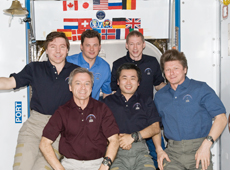
Astronauts from five space agencies on the ISS (Courtesy of NASA)
The ISS project involves 15 countries working closely together. I think this is the largest international scientific project ever. International collaboration is essential as we continue to expand the frontier of human activity into the universe. I believe the ISS is an important platform for future international collaboration in the area of science and technology.
While I was on the ISS, we have increased the number of crewmembers of the ISS from three to six for the first time. We came from the United States, Russia, Europe, Canada, and Japan-the five participating space agencies, brought together in space. Having six crewmembers is an extremely important milestone in the ISS project to fully utilize the capabilities of the onboard laboratories. I think this is a symbolic event that underlines the merit of international collaboration.
Q. How will long stays in space by Japanese astronauts benefit our life on Earth?
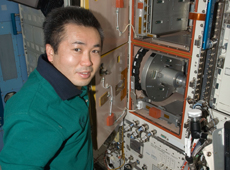
Astronaut Wakata working on the Cell Biology Experiment Facility (CBEF) in Kibo (Courtesy of NASA)
Kibo is used for various purposes, including scientific experiments such as in life and material sciences, as well as art experiments and educational programs. The discoveries and technologies gained through these experiments are valuable because they can improve our life on Earth.
For example, in the field of medicine, I was part of the joint Japan-U.S. experiment to test the effectiveness of a class of anti-osteoporosis drugs called Bisphosphonates in preventing bone density loss in a gravity-free environment. I was the first test subject to take these drugs regularly in space. If they are found to work, I believe this experiment will gain significant data not just in preventing bone density loss in space but also in finding treatment for osteoporosis patients on Earth.
There are potential risks and subsequent uncertainties when becoming the first to try out a new drug that has never been tested in space before. I accepted to be a test subject because the background information provided in advance about the risks and benefits related with the experiment seemed plausible. Besides, I felt encouraged by the fact that a Japanese researcher was involved in the study together with the researchers in the US. Japanese astronauts contribute to the experiments led by Japanese and overseas researchers, and help the country lead the world in space medicine research. This is one significant rationale for a Japanese astronaut to participate on a long-duration space flight.